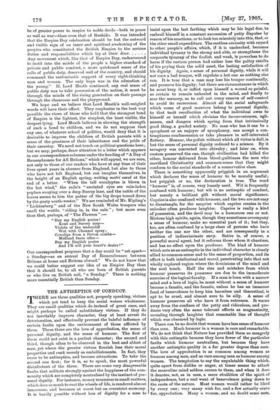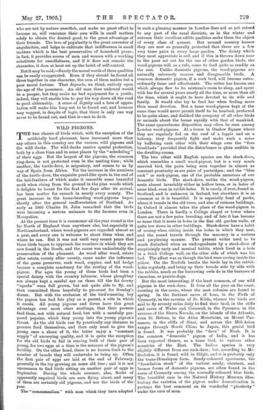THE ANTISEPTICS OF CONDUCT.
THERE are three qualities not, properly speaking, virtues
which yet tend to keep the social waters wholesome. They are small qualities which do instead of great ones, and might perhaps be called substitutory virtues. If they do not inevitably improve character, they at least arrest its deterioration, and effectually prevent the baleful influence of certain faults upon the environment of those afflicted by them. These three are the love of approbation, the sense of personal dignity, and the sense of humour. The first of them could not exist in a perfect character; the second and third, though often to be observed in the best and ablest of men, yet where the greater virtues flourish lose their moral properties and rank merely as embellishments. In fact, they cease to be antiseptics, and become attractions. To take the second one first; for it is, so to speak, the most powerful disinfectant of the three. There are some very disagreeable faults that militate strongly against the happiness of the com- munity which are completely neutralised by the instinct of per- sonal dignity. For instance, money meanness in small matters, which does so much to rust the wheels of life, is rendered almost innocuous, and becomes at worst but an overstrict economy. It is hardly possible without loss of dignity for a man to insist upon the last farthing which may be his legal due, to embroil himself in a constant succession of petty disputes by reason of his exactions, or to look too minutely into this, that, or the other small expenditure. The restless curiosity with regard to other people's affairs, which, if it is unchecked, becomes individual tyranny in the strong and able, or strengthens the corporate tyranny of the foolish and weak, is powerless to do harm if the curious person had rather lose the paltry results of his prying than the solid asset, the lasting satisfaction of his dignity. Again, a sense of personal dignity, while it will not cure a bad temper, will regulate a hot one as nothing else can. It is true that a man may lose his temper continually, and preserve his dignity; but there are circumstances in which he must keep it, or inflict upon himself a wound so painful, so certain to remain unhealed in the mind, and finally to scar the memory, as to call out every reserve of self-control to avoid its recurrence. Almost all the, social safeguards which come of good manners belong to personal dignity, to that tacit recollection of what the individual owes to himself or herself which obviates the inconveniences, ugh- nesses, and dangers which spring from that intrinsically good thing, a graded society. No man who has it can be a sycophant or an enjoyer of sycophancy, can accept a con- temptuous condescension or take pleasure in self-interested flattery. Honour, the polish without which all virtue is dull, is but the sense of personal dignity reduced to a science. By it savagery was converted into chivalry ; and later on, when custom preserved the one, though civilisation had killed the other, honour delivered from blood-guiltiness the men who sacrificed Christianity and common-sense that they might conform to the social standards of a conservative class.
There is something apparently priggish in an argument which declares the sense of humour to be morally useful; but priggish or no, the declaration is true. The word "humour" is, of course, very loosely used. Wit is frequently confused with humour; but wit is no antiseptic of conduct, but merely a brilliant gift without moral significance. Caprice is also confused with humour, and the two are not easy to disentangle, for the surprise which caprice creates in the onlooker often produces laughter. Caprice is really a kind of possession, and the devil may be a humorous one or not. Riotous high spirits, again, though they sometimes accompany a sense of humour, make no essential part of it; but they, too, are often confused by a large class of persons who have neither the one nor the other, and are consequently in a position of indiscriminate envy. Satire is, of course, a powerful moral agent, but it reforms those whom it chastises, and has no effect upon the producer. The kind of humour which acts as an antiseptic in the individual character is closely allied to common-sense and to the sense of proportion, and its effect is both intellectual and moral, penetrating into that not wholly explored region where the dominions of the mind and the soul touch Half the sins and mistakes from which humour preserves its possessor are due to the immoderate exercise of the logical faculty. If a man is born with a narrow mind and a love of logic, he must without a sense of humour become a fanatic, and the fanatic, unless he has an immense fund of benevolence to keep him harmless and theoretical, is apt to be cruel, and almost sure to be silly. A sense of humour preserves all who have it from extremes. It warns away from the confines of the petty and ridiculous, and pro- duces very often the same tolerant effects as magnanimity, revealing through laughter that reasonable line of thought which was obscured by logic.
There can be no doubt that women have leas sense of humour than men. Much humour in a woman is rare and remarkable. We do not think that Nature has provided them so meagrely with this antiseptic because they have fewer of the particular faults which humour neutralises, but because they have another antiseptic quality in a far greater degree than men. The love of• approbation is as common among women as humour among men, and as rare among men as humour among women. The temptation to say the unpalatable thing which, quite apart from dislike or anger, at times seems to attaek the masculine mind seldom occurs to them, and when it does it denotes, not, as in men, a mere ebullition of the spirit of independence, but a real want of benevolence going down to the roots of the nature. Most women would rather be liked by every one; very many wish for, and a few actually crave for, approbation. Many a woman, and no doubt some men,
who are not by nature unselfish, and make no great effort to become so, will renounce their own wills in small matters solely to obtain the desired good, to the great advantage of their friends. The love of popularity is the great corrector of angularities, and helps to cultivate that indifference in small matters which is the best preservative of household peace; in fact, it provides scores of men and women with a working substitute for unselfishness, and if it does not remake the character, it does at least set up the habit of self-control.
But it may be said,—Surely the moral worth of these qualities can be easily exaggerated. Even if they should be found all three together in one character, the sum of them makes but a poor moral fortune. That depends, we think, entirely upon the age of the possessor. An old man thus endowed would be a pauper, but they make no bad equipment for a youth; indeed, they will enable him to pay his way down all the road to good citizenship. A sense of dignity and a love of appro- bation will make him long not to be found out, and humour may suggest, in despite of logic, that there is only one way never to be found out, and that is—not to do it.







































 Previous page
Previous page